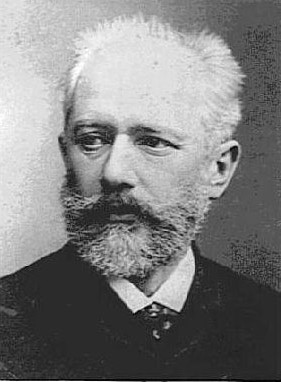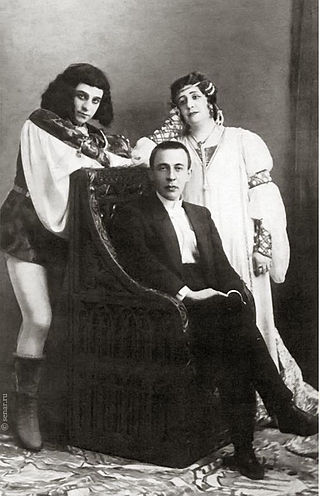
Francesca da Rimini: Symphonic Fantasy after Dante, Op. 32, is a symphonic poem by Pyotr Ilyich Tchaikovsky. It is a symphonic interpretation of the tragic tale of Francesca da Rimini, a beauty immortalized in Dante's Divine Comedy .

Francesca da Rimini: Symphonic Fantasy after Dante, Op. 32, is a symphonic poem by Pyotr Ilyich Tchaikovsky. It is a symphonic interpretation of the tragic tale of Francesca da Rimini, a beauty immortalized in Dante's Divine Comedy .
On 27 July 1876, Tchaikovsky wrote:
Later that summer, he visited Bayreuth to attend Der Ring des Nibelungen . [2] He composed Francesca in Moscow in October and November. [3] It is dedicated to his friend and former pupil Sergei Taneyev. It was first performed early in 1877 in Moscow in a concert by the Russian Musical Society, conducted by Nikolai Rubinstein.
In this fantasia, Tchaikovsky presents a symphonic interpretation of the tragic tale of Francesca da Rimini, a beauty who was immortalized in Dante's Divine Comedy . In the fifth canto of Inferno, Dante the narrator meets the shade of Francesca da Rimini, a noblewoman who fell in love with the brother of her cruel husband. After the husband discovered the lovers and killed them, the lovers were condemned to Hell for their adulterous passions. In their damnation, the lovers are trapped together in a violent storm, whirled through the air around the second circle of Hell, never to touch the ground again. They are tormented most of all by the ineradicable memory of the joys and pleasures of the embraces they shared in life.
Of fantasias in general, Tchaikovsky wrote:
The work was influenced by his exposure to Wagner. [5] [6] Tchaikovsky wrote "The comment that I wrote that under the influence of the Nibelungs is very true. I felt it myself when I was working on it," adding "Is it strange that I should be subject to the influence of a work of art which in general I find very antipathetic?" [7]
Immediately before writing Francesca, Tchaikovsky heard and reviewed Liszt's Dante Symphony , which is inspired by the same story, praising many aspects but noting it had little invention. Critics have contrasted the relative inventiveness of Francesca. [8]
Contemporary critic Herman Laroche called Francesca "extraordinarily brilliant", noting that the "blinding play of the orchestral colors, inexhaustibly rich and incessantly changing, holds the listener from beginning to end as if held sway by some hallucination." [9]
Later in his career, when he toured Europe conducting his work, Tchaikovsky regularly included Francesca in the program, for example in Paris in 1881, [10] Berlin in 1889, [11] and Cambridge in his last year of life. [12] The Cambridge performance was on the occasion of the presentation of honorary degrees to several composers. Among them was Saint-Saëns, who wrote:
The piece has a duration of around 25 minutes. Catherine Coppola has published an academic analysis of the work. [14]
The music is scored for 3 flutes (third doubling piccolo), 2 oboes, English horn, 2 clarinets in A, 2 bassoons, 4 horns, 2 cornets in A, 2 trumpets in E, 3 trombones, tuba, timpani, bass drum, cymbals, tam tam, harp and strings. [15]
This symphonic poem has an introduction and three parts.

Leopold Anthony Stokowski was a British-born American conductor. One of the leading conductors of the early and mid-20th century, he is best known for his long association with the Philadelphia Orchestra. He was especially noted for his free-hand conducting style that spurned the traditional baton and for obtaining a characteristically sumptuous sound from the orchestras he directed.

The Saint Petersburg Philharmonic Orchestra is a symphony orchestra based in Saint Petersburg, Russia. Their home venue is the Saint Petersburg Philharmonia.

Francesca da Rimini or Francesca da Polenta was a medieval noblewoman of Ravenna, who was murdered by her husband, Giovanni Malatesta, upon his discovery of her affair with his brother, Paolo Malatesta. She was a contemporary of Dante Alighieri, who portrayed her as a character in the Divine Comedy.

Pyotr Ilyich Tchaikovsky's Symphony No. 4 in F minor, Op. 36, was written between 1877 and 1878. Its first performance was at a Russian Musical Society concert in Moscow on February 22, 1878, with Nikolai Rubinstein as conductor. In Central Europe it sometimes receives the nickname "Fatum", or "Fate".

William Steinberg was a German-American conductor.

Francesca da Rimini, Op. 25, is an opera in a prologue, two tableaux and an epilogue by Sergei Rachmaninoff to a Russian libretto by Modest Ilyich Tchaikovsky. It is based on the story of Francesca da Rimini in the fifth canto of Dante's epic poem The Inferno. The fifth canto is the part about the Second Circle of Hell (Lust). Rachmaninoff had composed the love duet for Francesca and Paolo in 1900, but did not resume work on the opera until 1904. The first performance was on 24 January 1906 at the Bolshoi Theatre, Moscow, with the composer himself conducting, in a double-bill performance with another Rachmaninoff opera written contemporaneously, The Miserly Knight.
A Symphony to Dante's Divine Comedy, S.109, or simply the "Dante Symphony", is a choral symphony composed by Franz Liszt. Written in the high romantic style, it is based on Dante Alighieri's journey through Hell and Purgatory, as depicted in The Divine Comedy. It was premiered in Dresden on 7. November 1857, with Liszt conducting himself, and was unofficially dedicated to the composer's friend and future son-in-law Richard Wagner. The entire symphony takes approximately 50 minutes to perform.

Carlos Païta was an Argentine conductor. He was born in Buenos Aires.

Pyotr Ilyich Tchaikovsky wrote his Symphony No. 1 in G minor, Winter Daydreams , Op. 13, in 1866, just after he accepted a professorship at the Moscow Conservatory: it is the composer's earliest notable work. The composer's brother Modest claimed this work cost Tchaikovsky more labor and suffering than any of his other works. Even so, he remained fond of it, writing to his patroness Nadezhda von Meck in 1883 that "although it is in many ways very immature, yet fundamentally it has more substance and is better than any of my other more mature works." He dedicated the symphony to Nikolai Rubinstein.
The Symphony No. 2 in C minor, Op. 17 by Pyotr Ilyich Tchaikovsky was composed in 1872. One of Tchaikovsky's joyful compositions, it was successful right from its premiere and also won the favor of the group of nationalistic Russian composers known as "The Five", led by Mily Balakirev. Because Tchaikovsky used three Ukrainian folk songs to great effect in this symphony, it was nicknamed the "Little Russian" by Nikolay Kashkin, a friend of the composer as well as a well-known musical critic in Moscow. Ukraine was at that time frequently called "Little Russia". According to historian Harlow Robinson, "Kashkin suggested the moniker in his 1896 book Memories of Tchaikovsky."
The Concert Fantasia in G, Op. 56, for piano and orchestra, was written by Pyotr Ilyich Tchaikovsky between June and October 1884. It was premiered in Moscow on 6 March [O.S. 22 February] 1885, with Sergei Taneyev as soloist and Max Erdmannsdörfer conducting. The Concert Fantasia received many performances in the first 20 years of its existence. It then disappeared from the repertoire and lay virtually unperformed for many years, but underwent a revival in the latter part of the 20th century.
Neil William Thomson is a British conductor and conducting professor.

Paolo Malatesta, also known as il Bello, was the third son of Malatesta da Verucchio, Lord of Rimini. He is best known for the story of his affair with Francesca da Polenta, portrayed by Dante in a famous episode of his Inferno. He was the brother of Giovanni (Gianciotto) and Malatestino Malatesta.
Pyotr Ilyich Tchaikovsky composed his Orchestral Suite No. 3 in G, Op. 55 in 1884, writing it concurrently with his Concert Fantasia in G, Op. 56, for piano and orchestra. The originally intended opening movement of the suite, Contrastes, instead became the closing movement of the fantasia. Both works were also intended initially as more mainstream compositions than they became; the fantasia was intended as a piano concerto, while the suite was conceived as a symphony.
Orchestral Suite No. 1 in D minor is an orchestral suite, Op. 43, written by Pyotr Ilyich Tchaikovsky in 1878 and 1879. It was premiered on December 20, 1879 at a Russian Musical Society concert in Moscow, conducted by Nikolai Rubinstein. The piece is dedicated to Tchaikovsky's patroness, Nadezhda von Meck.

Derek Gleeson is an Irish/American musician. Born in Dublin, Ireland. He is currently the music director and conductor of the Dublin Philharmonic Orchestra and has been the conductor at the Anna Livia Dublin International Opera Festival. Since 2012 Gleeson is also music director & conductor of the Rachmaninov Festival Orchestra. Since January 2016 Gleeson is Principal Guest Conductor or The Harbin Symphony Orchestra, Harbin, China. He also composes musical scores for film and television and of symphonic music for the concert hall.

Paolo and Francesca da Rimini is a watercolour by British artist and poet Dante Gabriel Rossetti, painted in 1855 and now in Tate Britain.

Paolo and Francesca is a sculptural group by Auguste Rodin, showing Paolo and Francesca da Rimini, damned lovers from Canto V of Dante's The Divine Comedy.

The second circle of hell is depicted in Dante Alighieri's 14th-century poem Inferno, the first part of the Divine Comedy. Inferno tells the story of Dante's journey through a vision of the Christian hell ordered into nine circles corresponding to classifications of sin; the second circle represents the sin of lust, where the lustful are punished by being buffeted within an endless tempest.